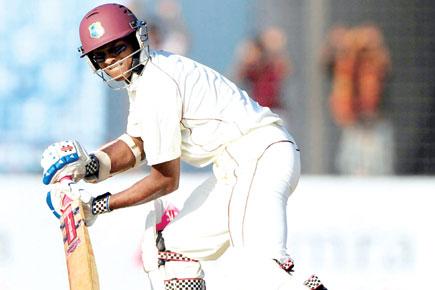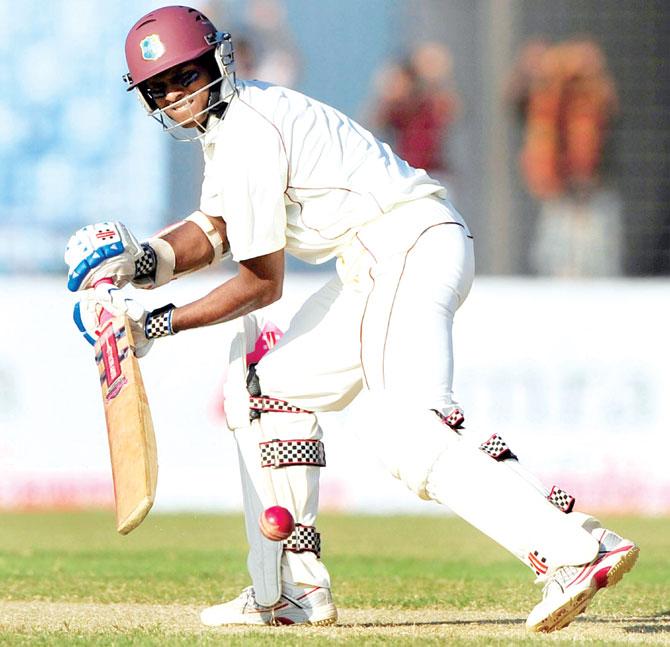With Chanderpaul, there were no flashing drives, cuts or hooks; he earned his runs with unshakable patience allied to steely wrists and an eye for profitable nudges and deflections through gaps in the field, writes Tony Cozier

Shivnarine Chanderpaul steers one down to third man vs Bangladesh in the 2011 Chittagong Test
West Indies cricket has always possessed at least one exceptional batsman. George Headley was the pioneer in the 1930s. He was followed by the prolific triumvirate of the three Ws, Frank Worrell, Everton Weekes and Clyde Walcott, Garry Sobers, Rohan Kanhai, Viv Richards, Brian Lara and Shivnarine Chanderpaul in the seven decades since the resumption of Tests after World War II.

Shivnarine Chanderpaul steers one down to third man vs Bangladesh in the 2011 Chittagong Test. Pic/AFP
ADVERTISEMENT
Another superstar may subsequently join the list but, given the game's rapid and significant changes, the certainty is that there will only ever be one Shivnarine Chanderpaul.
Decay of WI cricket
His retirement last week signalled the end of a unique career, all of it spent fighting lost causes as the decay of the West Indies' game set in. Through an unparalleled 21 years, 164 Tests, 268 ODIs, a total of 41 hundreds in both and 11,867 Test runs at an average of 51.37, he was the antithesis of the stereotype of West Indies batsmen as attacking, exciting stroke-makers.
With Chanderpaul, what you saw is what you got. There were no flashing drives and searing cuts and hooks. He simply did it in his understated way, earning most of his runs with unshakable patience allied to steely wrists and a keen eye for profitable nudges and deflections through gaps in the field.
He took a dim view of the advent of Twenty20 cricket.
"Batsmen just give themselves room and fire in that format," he once told me. "They don't care if they get out. That is why Test cricket will always be the ultimate. It tests whether you're a boy or a man."
In that sense, Chanderpaul was unquestionably a man with no time for the frivolity of the game's newest, shortest format. Regrettably the future of Tests, 'the ultimate', is in doubt, nowhere more so than in the West Indies.
His exit will be an anguished wrench as cricket has been his life. He was little more than a toddler when his father, Kemraj, uncle Munilal and whoever else was available in his village of Unity on the outskirts of the Guyana capital, Georgetown, bowled to him, hour after hour, in a vain attempt to dislodge him.
He first waddled to the wicket in outsized pads on his home ground of Bourda in Georgetown for his debut Test against England in 1994, aged 19. His unexpected selection caused a bit of a stir; his response was a defiant 62.
It immediately defined the character of his batting over the next two decades. He took 510 balls and close to 11 hours to compile an unbeaten 136 against India in Antigua in 2006. Two years later, he kept Australia in the field for just under 26 hours all told over three Tests in the Caribbean without being dismissed, rousing himself from a numbing blow to the helmet from Brett Lee to complete a hundred in Kingston.
It was not to say that his batting was entirely one-dimensional. He can lay claim to the fifth fastest hundred in all Test cricket, off 69 balls against Australia in Georgetown in 2003. His top ODI score of 150, against South Africa in East London in 1999, required only 136 balls.
His several foibles immediately identified him at the crease, most prominent a stance that became so increasingly front-on it was generally described as 'crab-like'. Whatever it was called, his record was proof of its success.
"When I started, I was very side-on, but would work across the crease and struggle for balance," he explained, confirming early video clips. "I gradually began to open up as I found I could balance a little better."
Captaincy in 2005
He briefly experienced the infighting that can undermine any sports team when made West Indies captain in 2005 after a strike by senior players. "It was a very difficult period for me," he recalled. "As captain, I wasn't getting any support. I couldn't focus on my own game." It prompted his resignation; Lara took over for his third stint in the post.
Ever a man of few words, his views on the game came across in quiet, measured tones. They were simple and invariably made sense although not often heeded by the modern generation.
"If you play bad shots, you're going to get out," he would say. "If you hit the ball in the air, you're going to get out. If you can bat to 50, you can bat to 100." He proved the theory 30 times in Tests, another 11 in ODIs.
Although he can see plenty of natural talent among the batsmen who will fill his spot in West Indies teams of the future, he detected little of the discipline to go with it.
"I see guys batting well and scoring, yet they still want to do something fancy," he said. "The pitches in the West Indies may not be the best nowadays but that's when you should be fighting to survive, not giving away you wicket."
Son rising
These are points he is trying to drill into those now coming along. Among them is his son, Tegenarine, Brendon to family, friends and fans, who opened the batting for the West Indies in the U-19 World Cup in 2014.
Also a left-hander, he played alongside his father two seasons ago in the same Guyana team in the West Indies' first-class tournament. His might well be the next Chanderpaul on a senior West Indies scoresheet. If he follows half his father's mantras, he will be a significant addition.
Based on his 49 not outs in Tests, selfishness is a tag sometimes attached to Chanderpaul senior. It is a charge that ignores both the effect of his position at numbers 5 and 6 in a team with a fragile tail-end and the question of how much worse the West Indies would have been without his reliability over an active span longer than any other. Heavy defeats in successive six Tests already verify how much he is missed.
Tony Cozier continues to be the voice of West Indies cricket
 Subscribe today by clicking the link and stay updated with the latest news!" Click here!
Subscribe today by clicking the link and stay updated with the latest news!" Click here!







